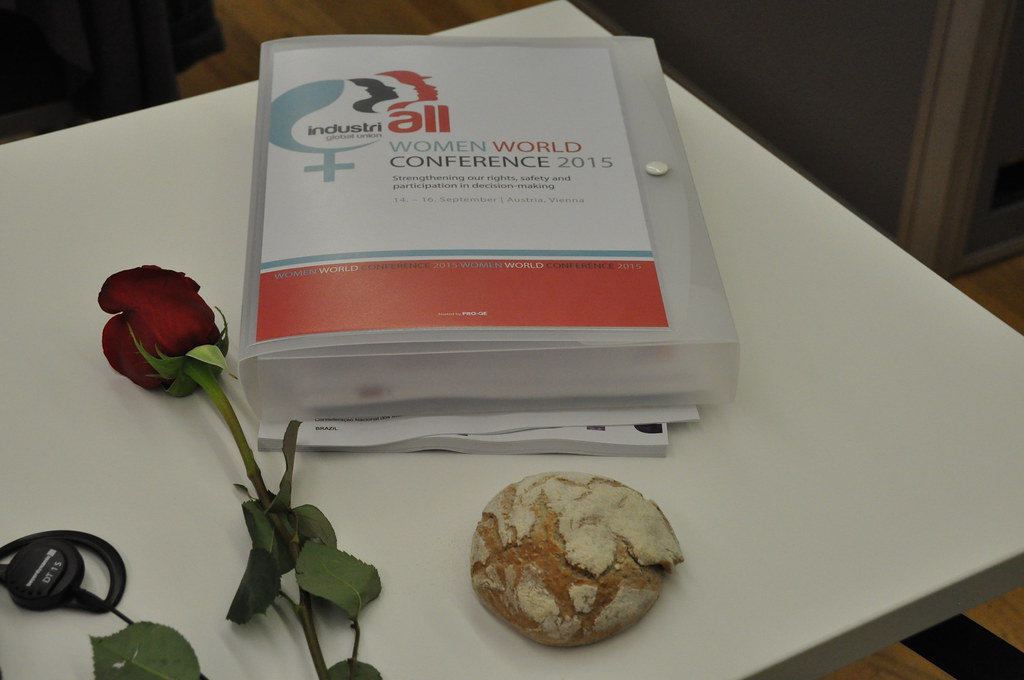17 September, 2015Hailed as a milestone in strengthening IndustriALL Global Union, the first Women World Conference in Vienna saw more than 300 women trade unionists from over 60 countries unite to address challenges facing women in the workplace.
The lively and engaging conference, which ran from 14 to 16 September, was marked by its inclusiveness – 86 women were able to participate in the debates which took place across two days.
In a key outcome, the conference unanimously passed a resolution to increase the percentage of women in lndustriALL leadership from 30 to 40 per cent.
The proposal will be taken to IndustriALL’s Congress in Rio in 2016 for inclusion in IndustriALL’s statutes.
“Here it is not just a question of mere figures, but of transforming structures. If the trade union movement is to be transformed, then women need to be encouraged to join unions, and this will be more likely if the structures reflect the members that should be attracted,” says the resolution.
“Men and women working together to organize are more successful than men working alone,” said IndustriALL general secretary, Jyrki Raina, who endorsed the resolution for a 40 per cent quota.
The inaugural ceremony featured speeches from key figures from the Austrian government, including the President of Austria, Dr. Heinz Fischer. The President took up the key theme of the conference to end violence against women. As Austria is positioned at the heart of the Syrian refugee crisis in Europe, he said most women escaping conflict say the threat of sexual violence is one of the reasons for fleeing their country.
“All countries have good laws, but laws and reality are two different things, even in Austria. Trade unions and social partners can make good agreements to improve on legislation or to fill a vacuum; such as we have seen with the Bangladesh Accord where the agreement is saving lives,” said IndustriALL assistant general secretary Monika Kemperle.
Stop violence against women!
The conference endorsed a new IndustriALL campaign to stop violence against women. Participants at the conference called for the issue to be a permanent theme of IndustriALL’s work. Affiliate unions will be encouraged to include the problem in networks and address it in collective bargaining.
Some conference participants told compelling stories about their fight for maternity rights. Only 28 per cent of the world’s women benefit from paid maternity leave, according to the United Nations.
Conference themes, women’s health and maternity protection, are integral to other areas of IndustriALL’s programme, in particular precarious work. Unions were reminded to take to the streets on 7 October, the World Day for Decent Work.
Conference adopted an Equality Charter and a paper on sustainability and women. The Equality Charter outlines women’s demands and outlines practical measures to achieve them.
The elections on day three confirmed Christine Olivier from NUMSA, South Africa and Gwenne Farrell from COPE, Canada, as co-chairs of the women’s committee. At the 2016 Congress, the women’s committee will introduce a system whereby the co-chairs will be rotated according to region. The first co-chairs from 2016 will be from Latin America and Asia/Pacific.
"The conference has really inspired me and showed us the reality of the other regions and the problems that they have. It has given us more strength and more power. I am leaving with more energy and more ideas,” said Diana Junquera from FITAG-UGT in Spain.
Looking forward, IndustriALL needs to broaden participation among young women workers, as a means to strengthen the organization. This was an aim supported by several young speakers at the conference.
“I’ve never seen women so united in confronting the struggles that women face on a daily basis. It was clear that the struggles of women all over the world are the same and therefore we should continue with the solidarity and the unity that we saw at the conference in the future,” said Christine Olivier, co-chair of the women’s committee.










